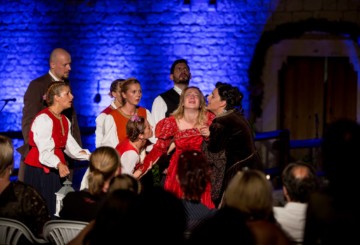Uncle Maroje? Pomet? Laura the courtesan? Ugo the Kraut? You’re probably not familiar with these rumbustious, larger-than-life characters from the Croatian stage. But to the average Dubrovnik schoolchild they are just as well-known as Falstaff, Puck, Miranda or Sir Toby Belch might be to their English-speaking counterparts.
These Croatian characters are all the fictional creations of Marin Držić (1508-1567), the Dubrovnik playwright who was in many ways the Croatian predecessor of the more globally-recognized William Shakespeare. Držić has always been pretty impenetrable to non-Croatian speakers, a situation that may well be rectified with the appearance of a new English version of Držić’s best known play Dundo Maroje (“Uncle Maroye” in Filip Krenus’s excellent new translation), published to celebrate the 450th anniversary of Držić’s death by the House of Marin Držić in Dubrovnik.
Like Shakespeare, Držić was a versatile dramatist who wrote comedies, tragedies and fantasy plays – although large chunks of his work have been lost and it’s the comic side of is oeuvre that is best remembered. Written in 1551, Dundo Maroje is one of the most complete examples of his work to survive. Its hero, Dubrovnik merchant Dundo Maroje, sends his son Maro to Italy with 5000 ducats in order to conduct a business deal; young Maro inevitably spends all the money on booze and women. Dundo Maroje travels to Italy to seek him out, and after being initially cold-shouldered, conspires to get Maro’s filial loyalty back again. Appearing to manipulate events behind the scenes is Pomet, a mercurial manservant who is clearly a personification of Držić himself.
We don’t actually know the facts of Držić’s biography in great detail, but it contains enough suggestions of espionage and political conspiracy to feed endless speculation. The son of once-noble parents who had fallen on hard times, Držić was ordained as a priest, played the organ with distinction, and studied in Siena, where he took part in theatrical entertainments. He entered the service of the Austrian Count Rogendorf, an ambiguous personality who travelled a great deal and for a long period lived in Constantinople – Rogendorf was an agent of either the Austrian government or the Ottomans, and quite possibly a double-agent serving both. At any rate Držić was witness to the complex world of diplomats and spies, experience which came in useful when he started writing dramas.
Back in Dubrovnik, Držić’s first play Pomet was performed in 1548 but is now lost. Even 1551’s Dundo Maroje is incomplete, as bits of the ending appear to be missing. Držić’s plays were usually performed in the open air, either in public spaces such as the square in front of the Rector’s Palace, or in the courtyards of aristocratic houses. Performances took place on public holidays or at aristocratic parties; sometimes they formed part of the entertainment at wedding receptions.
Rather like William Shakespeare in the English language, Držić brought modern theatrical techniques of plotting and suspense to the hitherto rather knockabout comedies of the day, transforming Croatian drama into a subtle vehicle not just for entertainment but also social satire and sly commentary on the playwright’s own life and times. Držić used the everyday language of the period in order to give authenticity to his characters and bring them closer to the public.
Indeed Držić was a well-known critic of the Dubrovnik Republic, an oligarchy controlled by a web of leading families. He spent the last years of his life as an exile in Venice, where he wrote a famous sequence of seditious letters to the Medici family of Florence, requesting their help in overthrowing the Dubrovnik aristocracy.
Of course you should really try and see Držić on stage in order to fully appreciate what he was trying to achieve and how he fits in, globally, with the great writers of the Renaissance. Sadly there are few opportunities to do this; unlike Shakespeare, Držić does not feature all that regularly in the repertoire of modern-day Croatian theatres, and there is very little in the way of TV or film adaptations that would serve as a useful way in to his oeuvre. In 2006 veteran director Veljko Bulajić made the film Libertas, dealing with Držić’s troubled relationship with his native city, but there is not (as far as we know) an English version.
One of the most successful recent attempts to wrestle with the Držić heritage is local writer-director Hrvoje Ivanković’s Victory over the Enemies, a postmodern meld of original Držić fragments and contemporary drama that was premiered at the Dubrovnik Summer Festival in 2017. It will be reprised at this year’s festival, when it will be performed in the courtyard of the art school with English surtitles.
You can also connect with Držić by visiting the House of Marin Držić at Široka 7 (B-3), where there’s a small display devoted to his life and work. And don’t forget the statue of Držić that sits scribbling away outside the Gradska kavana (D-3), its nose rubbed to a shine by people stroking it for good luck.
Above all Držić reminds us how important Dubrovnik was in the development of Croatian literature from the Renaissance onwards, an urban incubator for theatre and poetry that was equal in stature to the literary production of Western Europe. English-language translations have always been lacking, however; a situation that “Uncle Maroye” looks set to put right.
Written by Jonathan Bousfield


